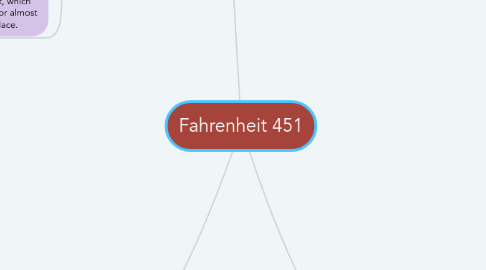
1. Recurring Themes
1.1. Technology
1.1.1. Many times throughout the story technology is portrayed in a bleak way.
1.1.2. Technology seems partially blamed for the setting that the book takes place in.
1.1.3. It is almost portrayed as an antagonist in the way it is described as causing this situation.
1.2. Individuality
1.2.1. Many times throughout the book the main character questions their own identity.
1.2.2. The reader themselves is also forced to contemplate their own identity when reading the book.
1.2.3. The main character frequently splits his identity in a way. Claiming his hand has done something, as if its acting of its own accord.
1.3. Ignorance is Bliss
1.3.1. Everyone is supposed to be 'happy', this is achieved by making everyone feel equal and having no will to ask big questions.
1.3.2. The way that the main character questions things that Clarisse tells him, because he has never though of them before.
1.3.3. When Guy discovers how little he really knows he realizes that he isn't truly happy, this was foreshadowed in the beginning when Clarisse asks him if he is happy during their first meeting.
2. Conflicts
2.1. Clarisse showing up
2.1.1. Clarisse is very different from everyone else and thinks differently, which intrigues Guy.
2.1.2. Clarisse establishes a routine everyday where she talks with Guy, and this subconsciously causes Guy to think differently.
2.1.3. When Clarisse is gone Guy starts to doubt himself and the world around him, which leads into another conflict.
2.2. Self doubt
2.2.1. Over the course of the story Guy questions many things, including his job, and how burning those books is like burning a person in a way.
2.2.2. Guy begins to doubt aspects of himself, such as his love for his wife, and he realizes he doesn't even remember when they met.
2.2.3. After the incident where the lady is burned with her books, he begins to doubt the world around him, and proclaims he will never do his job again.
2.3. Mildred attempts suicide
2.3.1. This is one of the first conflicts in the book and sets the tone for the setting. It shows that humans are seen as disposable and that many feel unhappy about the way things are.
2.3.2. This connects with Guy's self doubt in that he realizes he wouldn't cry if she died. And in a way he realizes he isn't really happy.
2.3.3. We learn that she doesn't remember it or doesn't believe she would do it, which shows almost a state of denial or almost brainwashing among the populace.
3. Key Ideas
3.1. Please don't burn books
3.1.1. It's obvious, but the point the author is trying to get across is that we shouldn't forget about books and let ourselves be consumed completely be all this new technology like tv.
3.1.2. This book was written in a time when new technology like the tv was taking over and people for the first time saw books being replaced by other forms of entertainment. This period likely had an effect on how the author decided to portray technology in the book.
3.1.3. The way the book is written is giving off an air of discomfort in an attempt to convince us that a world without books would be one we don't want to live in. The author is trying to change the course he thought humanity might go down in an almost hyperbolic method, exemplifying the effects to a radical degree.
3.2. Knowledge
3.2.1. The whole setting has a sense of ignorance and complacency, and a sense that what knowledge one can gather is more valuable, as nobody is allowed to be particularly smarter than the other.
3.2.2. The setting also gives off a sense of forbidden knowledge that's supposed to be locked away. Books are outlawed and everybody is equal, which makes these books and the knowledge in them not only rare, but in a way, cursed.
3.2.3. Fahrenheit 451 consistently presents the idea that knowledge is acquired not just by reading a book, but by challenging the status quo and from experience.
3.3. Nature and man
3.3.1. Clarisse mentions many times that she loves nature, and is often portrayed as a wise, if quirky, individual.
3.3.2. There is a showdown between nature and technology, and its constantly brought up that man works best with nature, with technology if used too much can cause harm.
3.3.3. With technology painted in such as cold light, nature is presented as being almost a savior, and along with nature comes knowledge. This makes knowledge and by extension the items that hold knowledge, books, seem like a natural friend of mankind.

